通用版小学英语“一般现在时”知识点总结 课件(共20张PPT)
文档属性
| 名称 | 通用版小学英语“一般现在时”知识点总结 课件(共20张PPT) | 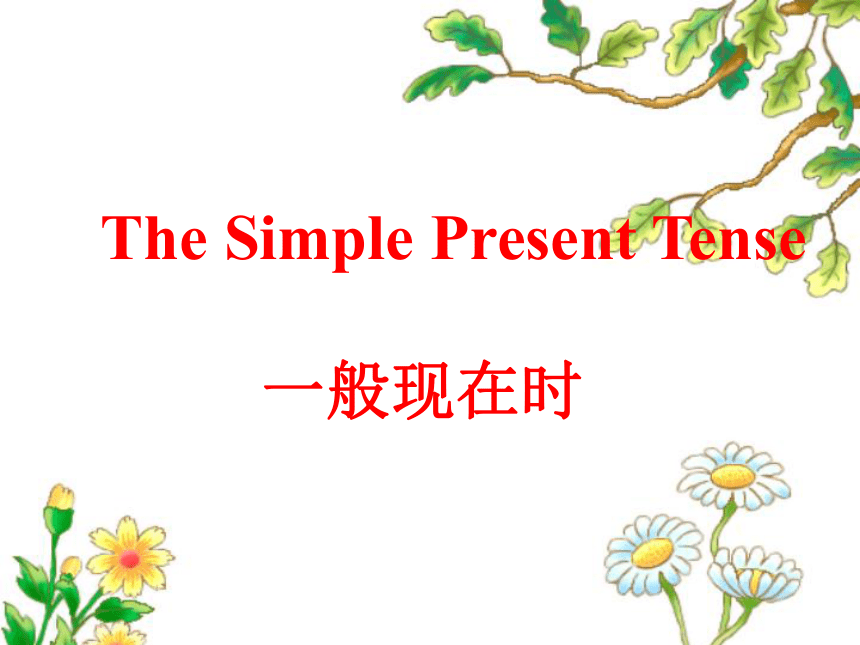 | |
| 格式 | zip | ||
| 文件大小 | 576.5KB | ||
| 资源类型 | 教案 | ||
| 版本资源 | 通用版 | ||
| 科目 | 英语 | ||
| 更新时间 | 2022-10-20 21:22:47 | ||
图片预览

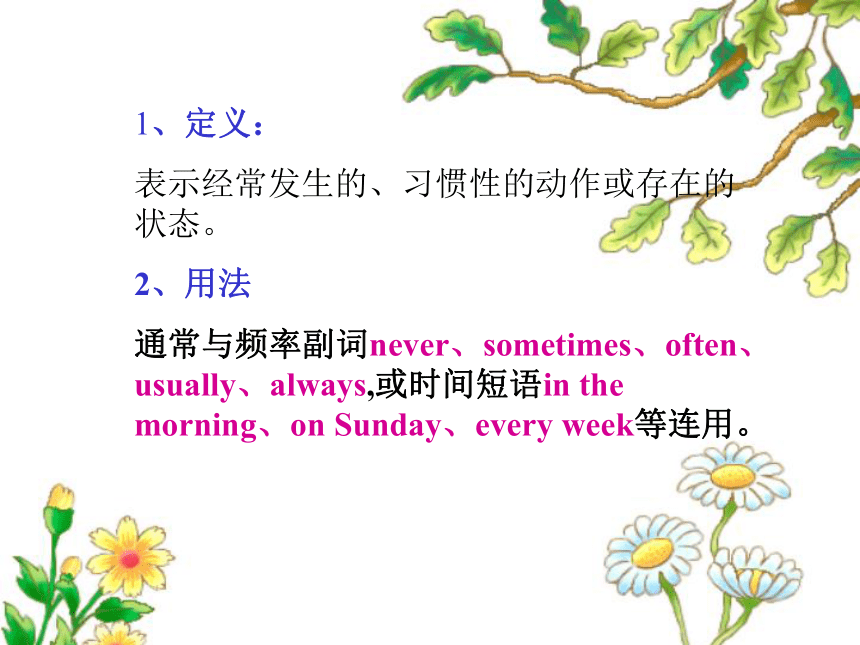
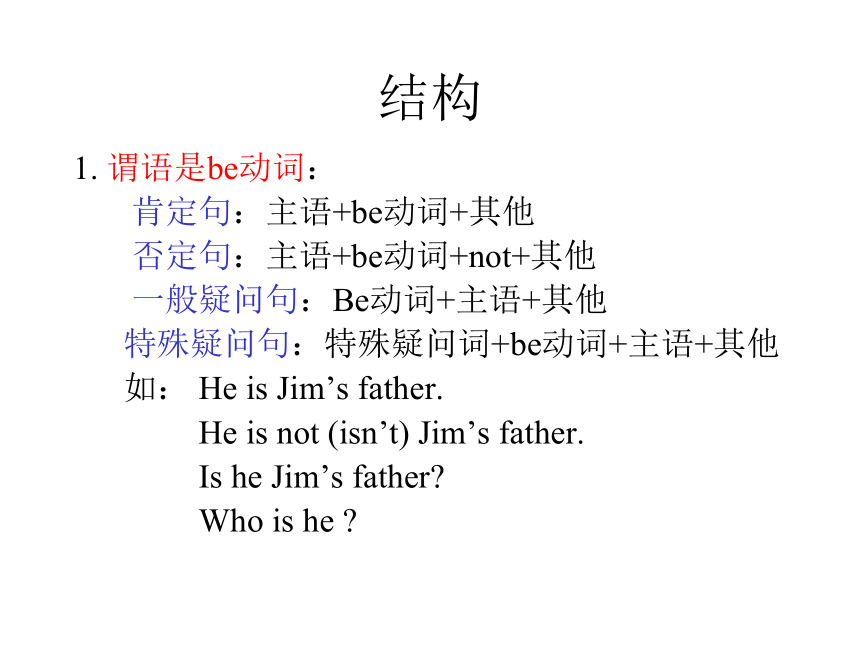
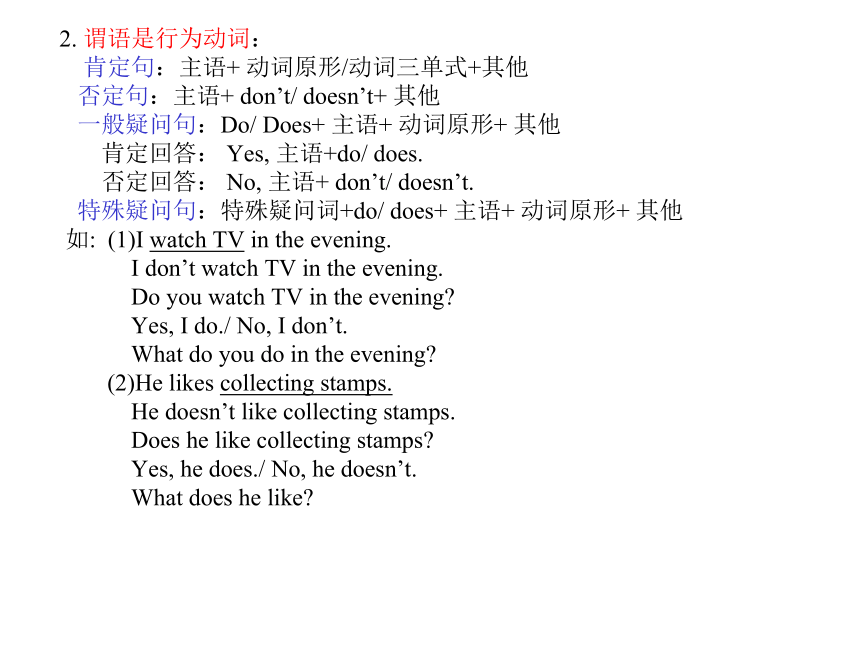
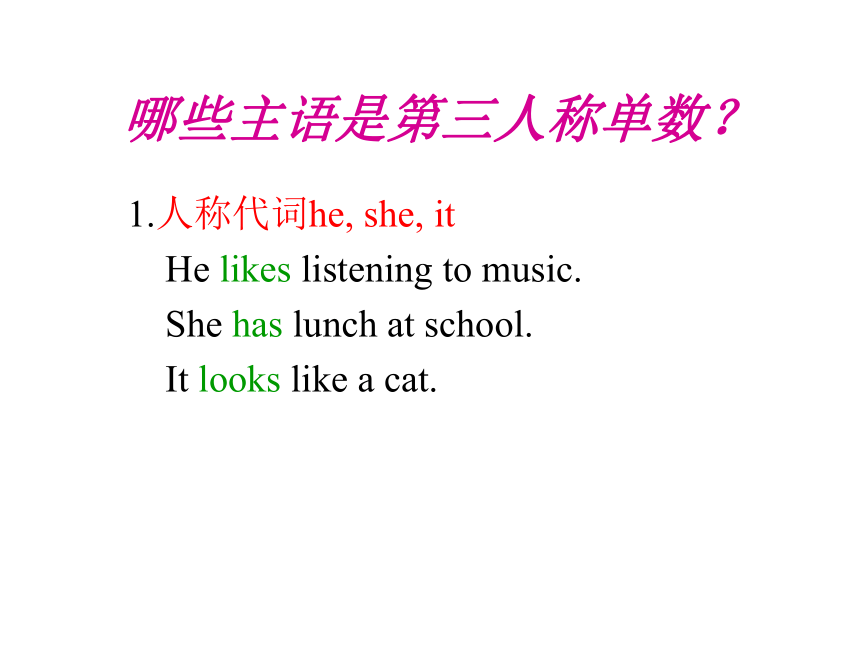
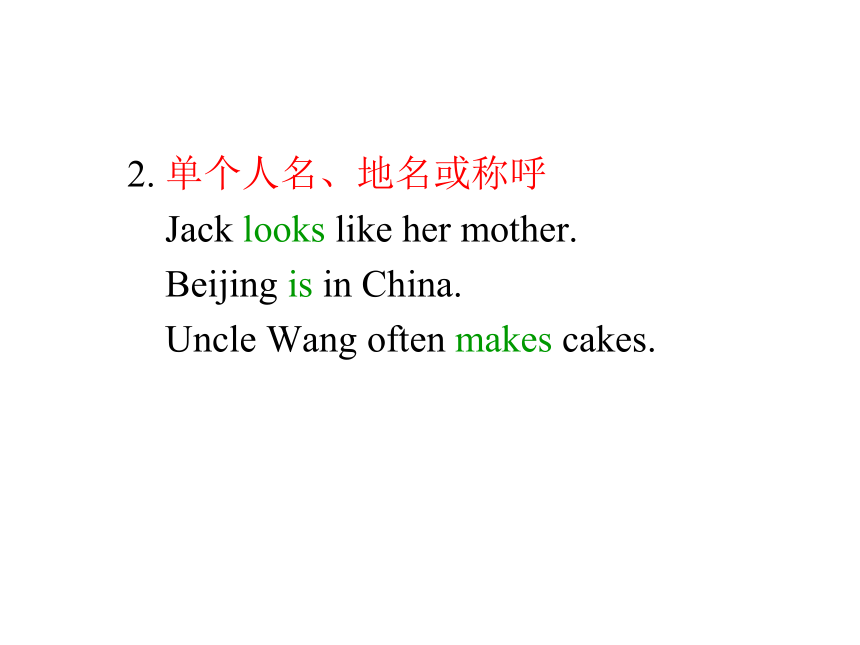
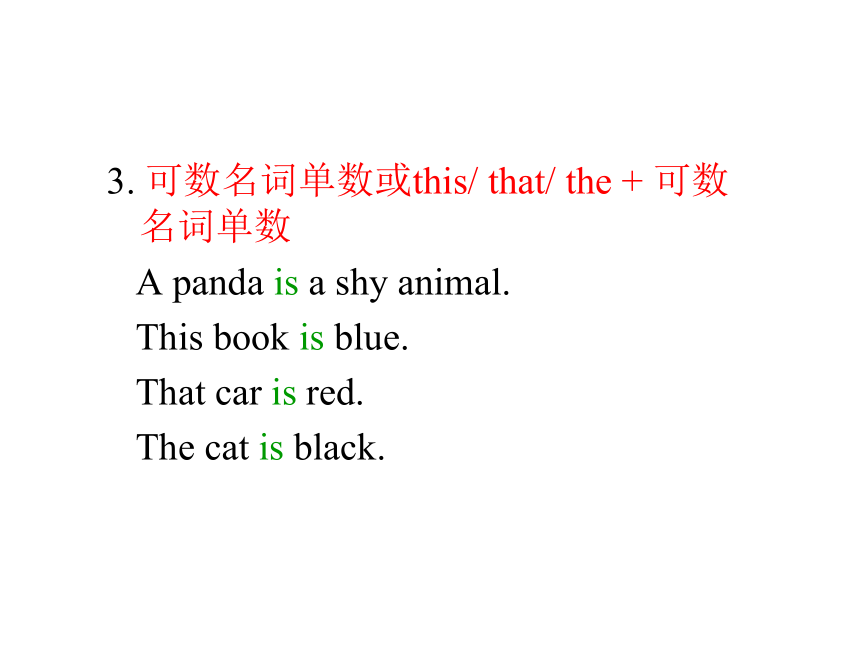
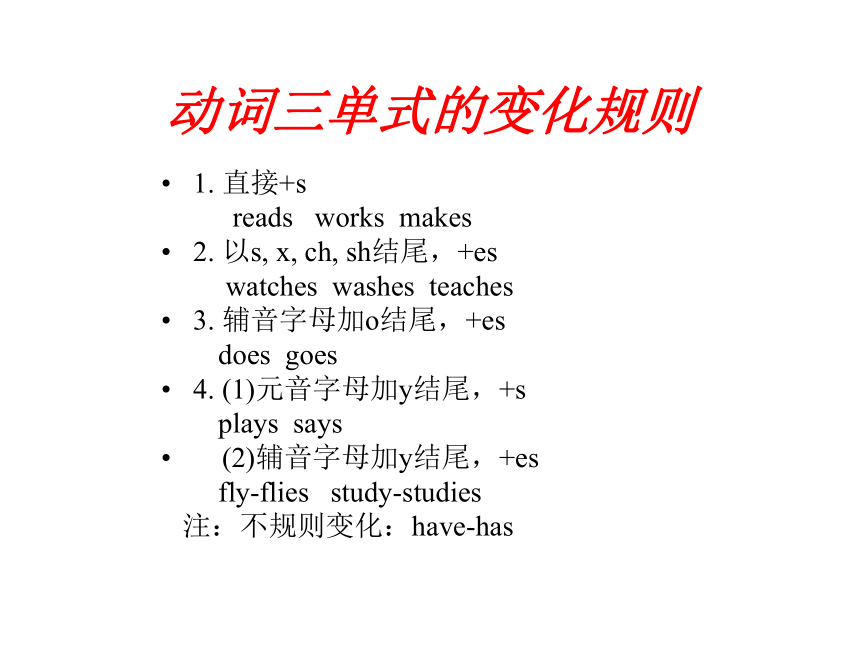
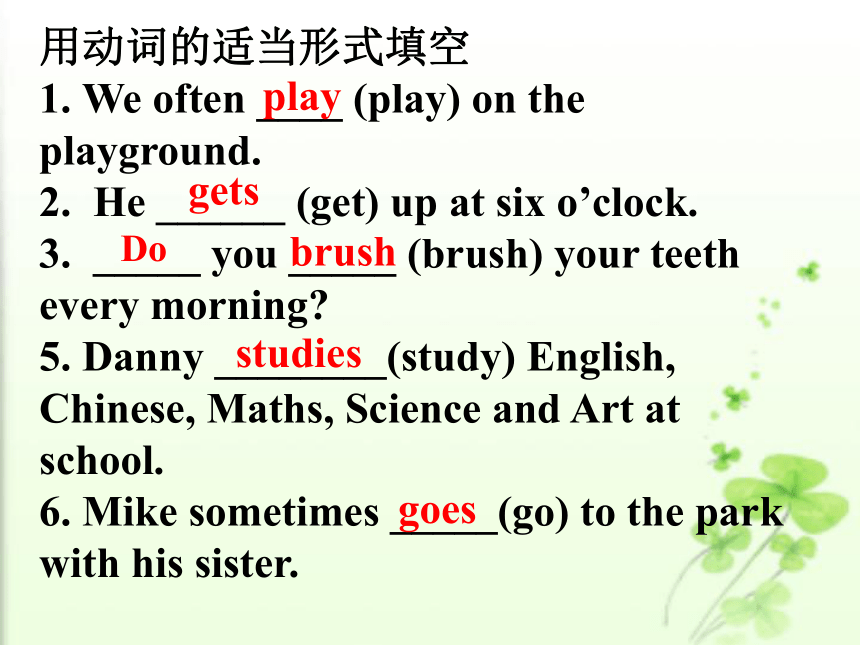
文档简介
(共20张PPT)
The Simple Present Tense
一般现在时
1、定义:
表示经常发生的、习惯性的动作或存在的状态。
2、用法
通常与频率副词never、sometimes、often、usually、always,或时间短语in the morning、on Sunday、every week等连用。
结构
1. 谓语是be动词:
肯定句:主语+be动词+其他
否定句:主语+be动词+not+其他
一般疑问句:Be动词+主语+其他
特殊疑问句:特殊疑问词+be动词+主语+其他
如: He is Jim’s father.
He is not (isn’t) Jim’s father.
Is he Jim’s father
Who is he
2. 谓语是行为动词:
肯定句:主语+ 动词原形/动词三单式+其他
否定句:主语+ don’t/ doesn’t+ 其他
一般疑问句:Do/ Does+ 主语+ 动词原形+ 其他
肯定回答: Yes, 主语+do/ does.
否定回答: No, 主语+ don’t/ doesn’t.
特殊疑问句:特殊疑问词+do/ does+ 主语+ 动词原形+ 其他
如: (1)I watch TV in the evening.
I don’t watch TV in the evening.
Do you watch TV in the evening
Yes, I do./ No, I don’t.
What do you do in the evening
(2)He likes collecting stamps.
He doesn’t like collecting stamps.
Does he like collecting stamps
Yes, he does./ No, he doesn’t.
What does he like
哪些主语是第三人称单数?
1.人称代词he, she, it
He likes listening to music.
She has lunch at school.
It looks like a cat.
2. 单个人名、地名或称呼
Jack looks like her mother.
Beijing is in China.
Uncle Wang often makes cakes.
3. 可数名词单数或this/ that/ the + 可数名词单数
A panda is a shy animal.
This book is blue.
That car is red.
The cat is black.
动词三单式的变化规则
1. 直接+s
reads works makes
2. 以s, x, ch, sh结尾,+es
watches washes teaches
3. 辅音字母加o结尾,+es
does goes
4. (1)元音字母加y结尾,+s
plays says
(2)辅音字母加y结尾,+es
fly-flies study-studies
注:不规则变化:have-has
用动词的适当形式填空
1. We often ____ (play) on the playground.
2. He ______ (get) up at six o’clock.
3. _____ you _____ (brush) your teeth every morning
5. Danny ________(study) English, Chinese, Maths, Science and Art at school.
6. Mike sometimes _____(go) to the park with his sister.
play
gets
Do
brush
studies
goes
一般现在时(The Simple Present Tense)
1.表示现在的状态:
e.g. He is twelve.
She is at work.
2.表经常或习惯性的动作:
e.g. I get up at 6:30 every day.
He often goes to the English corner.
3.表主语具备的性格和能力等:
e.g. She likes noodles.
They speak French.
4.普遍真理和自然规律:
e.g. Two plus four is six.
The moon goes around the earth.
指示一般现在时的时间短语
1.频度副词: sometimes(有时), often,
always(总是), usually(通常), seldom, never(决不)
2. in the morning/afternoon/evening
3. every day/morning…
4. on Sundays(星期日)…
be 动词的一般现在时的句式:
肯定句:主语+be+表语(n., adj.等)
e.g. He is a worker.
You are thirteen.
They are in the classroom.
否定句:主语+be+ not+表语
e.g. He is not a worker.
You aren’t thirteen.
They aren’t in the classroom.
一般疑问句:Be+主语+表语
e.g. Is he a worker Yes, he is./No, he isn’t.
Are you thirteen
Are they in the classroom Yes, they are.
No, they aren’t.
特殊疑问句:疑问词+be+主语
e.g. What is he
How old are you Where are they
Fill the blanks
1、I _____ a teacher.
2、She _____ three years old.
3、She ___ ___ a student.
4、They ____ ____ in the classroom.
5、____ he a policeman
Yes, ____ ____./ No, ____ ____.
am
is
is
not
are
not
Is
he
is
he
isn’t
实义动词(第一人称、二人称、三人称复数)的一般现在时句式
肯定句:
主语(I/We/You/They)+v.+其他
e.g. We study in a high school.
They have a pet.
否定句;
主语(I/We/You/They)+do+ not+v.+其他
e.g. We don’t study in a high school.
They don’t have a pet.
一般疑问句;
Do+主语(I/we/you/they)+v.+其他
e.g. Do you study in a high school
Do they have a pet
Fill the blanks.
1、We _____ in the school. (study)
2、They ____ a lot of money. (have)
3、I _____ _____ much money. (not have)
4、They _____ _____ in the school. (not study)
5、____ you ____ any water
Yes, ____ ____.
No, ____ ____
study
have
don’t
have
don’t
study
Do
have
I
do
I
don’t
肯定句:
主语(He/She/It)+v-s/es+其他
e.g. He studies in a high school.
Lucy has a pet.
否定句:
主语(He/She/It)+does +not+v.+其他
e.g. He doesn’t study in a high school
Lucy doesn’t have a pet.
一般疑问句:
Does+主语(he/she/it)+V.+其他?
e.g. Does he study in a high school
Does Lucy have a pet
实义动词(第三人称单数)的一般现在时句式
Fill the blanks
1、He ______ TV for 16 hours every day.
2、Lily ____ up at six o’clock every morning.
3、She ______ _____ much money. (not have)
4、Tom ______ ______ in this school. (not study)
5、____ he ____ a computer
Yes, ____ ____
No, ____ _____
watches
gets
doesn’t
have
doesn’t
study
Does
have
he
does
he
doesn’t
Let’s correct:
I goes to school at six every day.
He don’t like playing football.
3. They likes playing games.
4. Daming watchs TV in the evening.
5. Does he usually has a party
6. What do they on Sunday
7. Tony goes always to school at eight o’clock.
8. What they eat in the party
9. Lily haves lunch at school.
10. What do his parents usually gives him
go
doesn’t
like
watches
have
do
has
give
Let’s practise:
I speak English.
2.We like maths.
3.They go swimming on Sundays.
4.He gets up very early.
5.The panda eats bamboo.
1.将下列句子改成否定句,一般疑问句并回答:
I don’t speak English.
Do you speak English Yes, I do/ No ,I don’t.
We don’t like maths.
Do you like maths Yes, we do/ No , we don’t.
They don’t go swimming on Sundays.
Do they go swimming on Sundays Yes ,they do/No , they don’t.
He doesn’t get up very early.
Does he get up very early Yes, he does/ No, he doesn’t.
The panda doesn’t eat bamboo.
Does the panda eat bamboo Yes,it does/ No, it doesn’t.
Let’s write :
请你根据杰克的兴趣爱好,为杰克设想一个充满乐趣的
星期天,(包括早,中,晚)他都做了些什么。要求用
一般现在时来写 ,字数8-10句。
Like Dislike
run go to the concert
play football listen to the music
go shopping play the piano
go to the cinema
watch TV
play computer games
KFC,noodles,oranges
speak English
The Simple Present Tense
一般现在时
1、定义:
表示经常发生的、习惯性的动作或存在的状态。
2、用法
通常与频率副词never、sometimes、often、usually、always,或时间短语in the morning、on Sunday、every week等连用。
结构
1. 谓语是be动词:
肯定句:主语+be动词+其他
否定句:主语+be动词+not+其他
一般疑问句:Be动词+主语+其他
特殊疑问句:特殊疑问词+be动词+主语+其他
如: He is Jim’s father.
He is not (isn’t) Jim’s father.
Is he Jim’s father
Who is he
2. 谓语是行为动词:
肯定句:主语+ 动词原形/动词三单式+其他
否定句:主语+ don’t/ doesn’t+ 其他
一般疑问句:Do/ Does+ 主语+ 动词原形+ 其他
肯定回答: Yes, 主语+do/ does.
否定回答: No, 主语+ don’t/ doesn’t.
特殊疑问句:特殊疑问词+do/ does+ 主语+ 动词原形+ 其他
如: (1)I watch TV in the evening.
I don’t watch TV in the evening.
Do you watch TV in the evening
Yes, I do./ No, I don’t.
What do you do in the evening
(2)He likes collecting stamps.
He doesn’t like collecting stamps.
Does he like collecting stamps
Yes, he does./ No, he doesn’t.
What does he like
哪些主语是第三人称单数?
1.人称代词he, she, it
He likes listening to music.
She has lunch at school.
It looks like a cat.
2. 单个人名、地名或称呼
Jack looks like her mother.
Beijing is in China.
Uncle Wang often makes cakes.
3. 可数名词单数或this/ that/ the + 可数名词单数
A panda is a shy animal.
This book is blue.
That car is red.
The cat is black.
动词三单式的变化规则
1. 直接+s
reads works makes
2. 以s, x, ch, sh结尾,+es
watches washes teaches
3. 辅音字母加o结尾,+es
does goes
4. (1)元音字母加y结尾,+s
plays says
(2)辅音字母加y结尾,+es
fly-flies study-studies
注:不规则变化:have-has
用动词的适当形式填空
1. We often ____ (play) on the playground.
2. He ______ (get) up at six o’clock.
3. _____ you _____ (brush) your teeth every morning
5. Danny ________(study) English, Chinese, Maths, Science and Art at school.
6. Mike sometimes _____(go) to the park with his sister.
play
gets
Do
brush
studies
goes
一般现在时(The Simple Present Tense)
1.表示现在的状态:
e.g. He is twelve.
She is at work.
2.表经常或习惯性的动作:
e.g. I get up at 6:30 every day.
He often goes to the English corner.
3.表主语具备的性格和能力等:
e.g. She likes noodles.
They speak French.
4.普遍真理和自然规律:
e.g. Two plus four is six.
The moon goes around the earth.
指示一般现在时的时间短语
1.频度副词: sometimes(有时), often,
always(总是), usually(通常), seldom, never(决不)
2. in the morning/afternoon/evening
3. every day/morning…
4. on Sundays(星期日)…
be 动词的一般现在时的句式:
肯定句:主语+be+表语(n., adj.等)
e.g. He is a worker.
You are thirteen.
They are in the classroom.
否定句:主语+be+ not+表语
e.g. He is not a worker.
You aren’t thirteen.
They aren’t in the classroom.
一般疑问句:Be+主语+表语
e.g. Is he a worker Yes, he is./No, he isn’t.
Are you thirteen
Are they in the classroom Yes, they are.
No, they aren’t.
特殊疑问句:疑问词+be+主语
e.g. What is he
How old are you Where are they
Fill the blanks
1、I _____ a teacher.
2、She _____ three years old.
3、She ___ ___ a student.
4、They ____ ____ in the classroom.
5、____ he a policeman
Yes, ____ ____./ No, ____ ____.
am
is
is
not
are
not
Is
he
is
he
isn’t
实义动词(第一人称、二人称、三人称复数)的一般现在时句式
肯定句:
主语(I/We/You/They)+v.+其他
e.g. We study in a high school.
They have a pet.
否定句;
主语(I/We/You/They)+do+ not+v.+其他
e.g. We don’t study in a high school.
They don’t have a pet.
一般疑问句;
Do+主语(I/we/you/they)+v.+其他
e.g. Do you study in a high school
Do they have a pet
Fill the blanks.
1、We _____ in the school. (study)
2、They ____ a lot of money. (have)
3、I _____ _____ much money. (not have)
4、They _____ _____ in the school. (not study)
5、____ you ____ any water
Yes, ____ ____.
No, ____ ____
study
have
don’t
have
don’t
study
Do
have
I
do
I
don’t
肯定句:
主语(He/She/It)+v-s/es+其他
e.g. He studies in a high school.
Lucy has a pet.
否定句:
主语(He/She/It)+does +not+v.+其他
e.g. He doesn’t study in a high school
Lucy doesn’t have a pet.
一般疑问句:
Does+主语(he/she/it)+V.+其他?
e.g. Does he study in a high school
Does Lucy have a pet
实义动词(第三人称单数)的一般现在时句式
Fill the blanks
1、He ______ TV for 16 hours every day.
2、Lily ____ up at six o’clock every morning.
3、She ______ _____ much money. (not have)
4、Tom ______ ______ in this school. (not study)
5、____ he ____ a computer
Yes, ____ ____
No, ____ _____
watches
gets
doesn’t
have
doesn’t
study
Does
have
he
does
he
doesn’t
Let’s correct:
I goes to school at six every day.
He don’t like playing football.
3. They likes playing games.
4. Daming watchs TV in the evening.
5. Does he usually has a party
6. What do they on Sunday
7. Tony goes always to school at eight o’clock.
8. What they eat in the party
9. Lily haves lunch at school.
10. What do his parents usually gives him
go
doesn’t
like
watches
have
do
has
give
Let’s practise:
I speak English.
2.We like maths.
3.They go swimming on Sundays.
4.He gets up very early.
5.The panda eats bamboo.
1.将下列句子改成否定句,一般疑问句并回答:
I don’t speak English.
Do you speak English Yes, I do/ No ,I don’t.
We don’t like maths.
Do you like maths Yes, we do/ No , we don’t.
They don’t go swimming on Sundays.
Do they go swimming on Sundays Yes ,they do/No , they don’t.
He doesn’t get up very early.
Does he get up very early Yes, he does/ No, he doesn’t.
The panda doesn’t eat bamboo.
Does the panda eat bamboo Yes,it does/ No, it doesn’t.
Let’s write :
请你根据杰克的兴趣爱好,为杰克设想一个充满乐趣的
星期天,(包括早,中,晚)他都做了些什么。要求用
一般现在时来写 ,字数8-10句。
Like Dislike
run go to the concert
play football listen to the music
go shopping play the piano
go to the cinema
watch TV
play computer games
KFC,noodles,oranges
speak English
